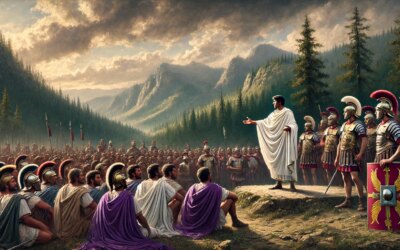Introduction: Rome’s Eastern Ambitions
In 63 BC, the Roman general Pompey the Great captured Jerusalem, bringing the ancient city under Roman control for the first time. This event was not merely the conquest of a city but a critical moment in the expansion of Roman influence into the eastern Mediterranean, setting the stage for centuries of Roman involvement in Judea and the broader Middle East.
Background: A Kingdom in Turmoil
The Hasmonean Kingdom of Judea had been wracked by civil war between two brothers, Hyrcanus II and Aristobulus II, both vying for the throne. Their dispute invited external intervention. When Pompey, fresh from campaigns against Mithridates VI of Pontus and the conquest of Syria, arrived in the region, both factions appealed to him for support, hoping to leverage Roman power to secure their own claims.
Pompey’s Decision
After assessing the situation, Pompey favored Hyrcanus II, viewing him as the weaker and more pliable ally. Aristobulus, realizing the tide was turning against him, attempted to resist, retreating to Jerusalem and fortifying the city against Roman siege. Pompey, unwilling to tolerate defiance, prepared for a direct assault on one of the world’s holiest cities.
The Siege and Capture of Jerusalem
Pompey’s forces besieged Jerusalem, facing stubborn resistance. After months of careful siegecraft, the Romans breached the city walls. Fighting was intense, particularly around the Temple Mount, where Aristobulus’ forces made their last stand. Despite Roman efforts to avoid desecrating sacred sites, significant bloodshed occurred within the Temple precincts, shocking even some Roman contemporaries.
Aftermath: Judea Under Roman Control
Following the fall of Jerusalem, Pompey entered the Holy of Holies within the Temple—a profound violation in Jewish law—though he refrained from looting the treasures. Hyrcanus II was restored as High Priest and nominal ethnarch, but true power resided with the Roman governor in Damascus. Judea became a client state of Rome, paying tribute and surrendering much of its former autonomy.
Impact on Roman Politics
The capture of Jerusalem enhanced Pompey’s prestige back in Rome, strengthening his political capital during an era of intense rivalry among Roman elites. However, the delicate balancing act in Judea foreshadowed the challenges Rome would face in managing diverse religious and cultural groups within its expanding empire.
Legacy of the 63 BC Conquest
Rome’s initial intervention in Judea would have long-term consequences. Over time, Roman interference fueled resentment and nationalist sentiment among Jewish populations, eventually culminating in later uprisings such as the Great Jewish Revolt of 66–73 AD. The Roman presence in Judea thus began with the calculated pragmatism of Pompey but evolved into a fraught and turbulent relationship that would span centuries.
Conclusion: A City at the Crossroads
The Roman capture of Jerusalem in 63 BC marked a turning point not only for Judea but for Rome itself. It was a testament to the Republic’s growing dominance in the East and an omen of the complex imperial challenges that lay ahead. In capturing Jerusalem, Pompey secured a strategic prize—but he also unwittingly set the stage for conflicts that would test Rome’s might and endurance for generations to come.






